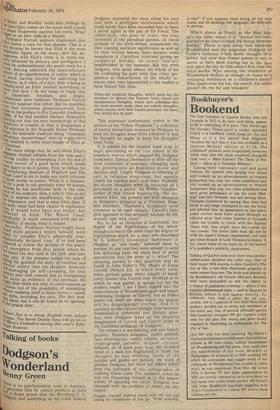ilalking of books 1 ,,_ 4 0dgSCOn's
Yonderland
eIiny Green
Th
50e re is no psychoanalyst, even in America, haigormless that he cannot produce at least 11„f a dozen proofs that the Reverend C. L. gson had something on his mind. Indeed
Dodgson scattered the clues along his own trail with a profligate recklessness which could hardly have been exceeded had he been a secret agent in the pay of Dr Freud. The rabbit-hole, the pool of tears, the tiny threshold to the paradisal garden, all thes& symbols of the birth-dream, remarkable for their cunning narrative significance as well as for their literary beauty, have become commonplaces of Carrollian criticism, giving an exegetical holiday to every literary headshrinker in the business. But not even Dodgson, who spent almost the whole of his life confessing his guilt with that crazy persistence so characteristic of the wholly innocent man, ever bequeathed to his readers a more blatant hint than:
There are sceptical thoughts, which seem for the moment to uproot the firmest faith; there are blasphemous thoughts, which dart unbidden into the most reverent souls; there are unholy thoughts, which torture, with their hateful presence, the fancy that would fain be pure.
This notorious confessional comes in the preface to his "Pillow Problems," a collection of mental distractions invented by Dodgson to keep his thoughts away from whatever it was he thought he ought to keep his thoughts away from. , It is ugeless for the modern. mind even to begin speculating on the true nature of the nameless horrors which plagued the Dodgson conscience. Eternal Damnation is after all the most transcient of concepts, changing with the generations as hemlines move and skylines shift. Clearly Dodgson is referring in part to religious misgivings, but equally clearly his troubles didn't stop there. Probably his secret thoughts were as innocent as a peccadillo at a picnic. As Martin Gardner, author of that critical masterwork, The Annotated Alice, has pointed out with reference to Dodgson's Potential as a Victorian Humbert Humbert, "Humbert's 'nymphets' were creatures to be used carnally. Carroll's little girls appealed to him precisely because he felt sexually safe with them." But so far as Dodgson is concerned, the degree of the frightfulness of his secret thoughts is less to the point than the degree of frightfulness which he, a man who described W. S. Gilbert's occasional 'damnmee' in Pinafore as "vile trash," believed them to possess. At any rate they were enough to send him skittering from the black bats of sinful speculation into the arms of — what? The amazing answer to that question may be found in John Fisher's The Magic of Lewis Carroll (Nelson £3), in which every trick, every parlour game, every sleight of hand, every illusion that Carroll ever invented or to which he was partial, is spread out for the modern reader. I see I have slipped into the nomenclature of Wonderland again and begun addressing Dodgson as Carroll, but as Fisher points out, there are areas where the deacon and his doppelganger overlap. And it is precisely in this curious twilight tone between mathematical orthodoxy and literary abandon, that Dodgson leans on the intuitive imagination of Carroll and Carroll looks to the Euclidean pedagogy of Dodgson.
The resource is astonishing, and also faintly pathetic. Thimbles disappear, mazes unravel, fans disintegrate, codes, riddles, acrostics, cryptograms, paradox, origami, circular billiards, all of them pour from the troubled mind of a man too frightened to think the . thoughts he was thinking. Some of the puzzles and games are patently the work of plodder Dodgson, but there are others which bear the hallmark of the cartographer of Looking Glass Land. For instance, when he
was not reassuring himself as to the impossibility of squaring the circle, Dodgson was obsessed with the problem of where the day begins:
Imagine yourself walking round with the sun and asking the inhabitants as you go, "What morning is this?" If you suppose them living all the way round, and all speaking one language, the difficulty is obvious.
Which plants us firmly at the Mad Hatter's tea table, where it is "always tea-time, and we've no time to wash the things between whiles." There is one other link between Wonderland and the magician Dodgson of Fisher's collation. I had never thought of it before, but now that Fisher points it out, it seems to have been staring me in the face ever since the day in 1936 when I first read the Alice books. Who among the residents of Wonderland dreZses as though en route to a conjuring exhibition at a children's party? Who fusses over his fan, his watch, his white gloves? Oh, my fur and whiskers!


































 Previous page
Previous page